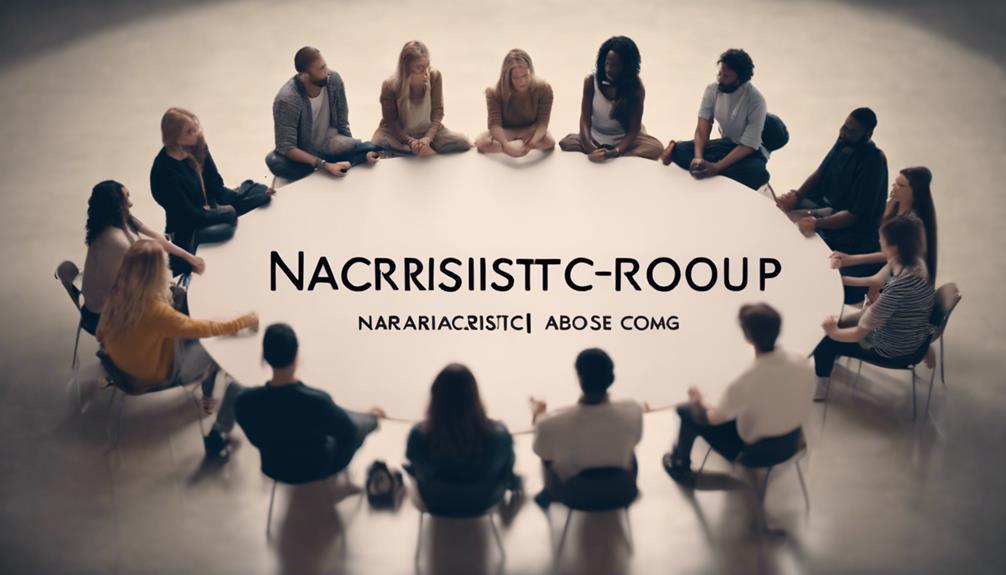When searching for support groups for narcissistic abuse, consider online platforms, local centers, therapist referrals, social networks, and nonprofit organizations. Online groups provide a virtual community for sharing experiences. Local centers offer welcoming spaces with customized activities. Therapist referrals connect individuals to trauma recovery experts. Social media networks host discussions and provide valuable resources. Nonprofits establish safe environments for survivors to express themselves. Exploring these options can aid in your healing journey, providing crucial resources and connections.
Key Takeaways
- Online Support Group Platforms offer virtual spaces for survivors to connect and share experiences.
- Local Community Centers provide safe environments with trained facilitators for healing.
- Therapist Referrals connect survivors with specialized professionals for tailored treatment plans.
- Social Media Support Networks offer 24/7 understanding and support from a global community.
- Nonprofit Organizations create safe spaces for survivors to express themselves and promote recovery.
Online Support Group Platforms
Online support group platforms provide a virtual space for survivors of narcissistic abuse to connect and share their experiences. These platforms offer a sense of community and understanding, fostering support among individuals who've faced similar challenges. Through online support groups, participants can find comfort in knowing they aren't alone in their struggles. The support gained from these platforms can be vital in the healing process, providing validation and empathy essential for recovery.
Virtual support groups are accessible from anywhere, making them convenient for individuals in different locations. Whether through forums, video calls, or chat features, participants can engage with others, offering and receiving support in real-time. Additionally, designated moderators or facilitators often oversee these groups, ensuring a safe and respectful environment for all members. This structure helps maintain the focus on support and guarantees that interactions remain constructive and beneficial for everyone involved.
Local Community Centers

Local community centers play an essential role in providing support groups for survivors of narcissistic abuse. These centers often host support groups that offer a safe and welcoming space for individuals seeking healing from the effects of narcissistic abuse. By joining these support groups, survivors can connect with others who've had similar experiences, fostering a sense of understanding and community.
At community centers, survivors of narcissistic abuse can access a variety of resources and activities tailored to support their healing journey. These support groups may be led by trained facilitators or mental health professionals who can offer guidance and support throughout the process. Additionally, the supportive environment created within these groups can empower survivors to share their stories, express their emotions, and learn coping strategies to navigate the challenges they may face.
Therapist Referrals

Utilizing therapist referrals can connect survivors of narcissistic abuse with specialized professionals trained in trauma recovery and healing. These referrals offer an essential link to therapists who can provide tailored treatment plans to address the unique needs of narcissistic abuse survivors. By seeking referrals from trusted sources or mental health organizations, individuals can guarantee they receive quality care from therapists experienced in supporting those who've endured such trauma.
Therapist referrals play a pivotal role in helping survivors process and overcome the effects of narcissistic abuse. These professionals offer a safe and supportive environment for individuals to explore their experiences, heal from past wounds, and develop coping strategies for moving forward. Whether through individual therapy or group sessions, therapists can guide survivors on a path towards healing and empowerment. Seeking therapist referrals is a necessary step in accessing the specialized help needed to navigate the complexities of narcissistic abuse recovery.
Social Media Support Networks

Numerous social media support groups cater to narcissistic abuse survivors, providing a virtual space for connection, sharing experiences, and seeking advice. These online networks, dedicated to Life After Narcissistic abuse, offer a 24/7 haven where individuals can find understanding and support from a global community. Moderated by designated individuals, these groups guarantee a safe and respectful environment for all members.
Within these groups, survivors can engage in online discussions, access valuable resources, and participate in live chats that offer immediate validation and support. Social media platforms like Facebook and Instagram host these support groups, making it convenient for individuals to join and benefit from the collective wisdom and empathy of others who've walked similar paths.
Whether seeking guidance, sharing stories, or simply finding solace in knowing you're not alone, these online support networks play a significant role in the healing journey of narcissistic abuse survivors.
Nonprofit Organizations

Nonprofit organizations like MyNARA offer essential support groups for victims of narcissistic abuse, fostering a safe and understanding environment for survivors to share their experiences. These organizations play a pivotal role in providing a supportive community for individuals who've endured narcissistic abuse.
Here are some key benefits of seeking support from nonprofit organizations:
- Trained Facilitators: Nonprofit support groups often have facilitators who are trained to guide discussions and provide valuable resources to participants.
- Safe Environment: These organizations prioritize creating a safe space where survivors can express themselves without fear of judgment.
- Online Sessions: Some nonprofit support groups offer online meetings, making it convenient for those unable to attend in-person gatherings.
- Empowerment Focus: Organizations like MyNARA focus on empowering survivors and aiding in the healing process after experiencing narcissistic abuse.
- Healing Promotion: Nonprofit support groups aim to promote healing and recovery from the effects of narcissistic abuse through various therapeutic approaches.
Frequently Asked Questions
Is There a Support Group for People in Relationship With Narcissist?
Yes, there are support groups for individuals in relationships with narcissists. These groups offer a safe environment to share experiences, gain insights, and receive validation. Participants learn coping strategies, boundary setting, and self-care practices.
Connecting with others facing similar challenges can reduce isolation and promote healing. Joining a support group empowers individuals to recognize red flags, establish boundaries, and prioritize their well-being in toxic relationships.
What Organization Helps Victims of Narcissistic Abuse?
We support victims of narcissistic abuse by offering a safe space for sharing experiences and connecting with others. MyNARA provides online forums, helplines, therapy, counseling, and legal aid assistance for protection orders.
Educating oneself about narcissistic abuse is empowering and essential for healing. Our organization is dedicated to helping survivors navigate the complexities of abuse and find the support they need to heal and move forward.
Is There a Free Recovery Program for Narcissistic Abuse?
Yes, there are free recovery programs available for narcissistic abuse. Community organizations, online resources, and some support groups offer complimentary services to survivors seeking healing. Nonprofit organizations and mental health centers also provide free support programs.
Online platforms like forums and virtual groups can offer resources for recovery. Local community centers or churches may host free support groups for those affected by narcissistic abuse. Researching these options can help in finding suitable support.
How Do I Find Myself After Narcissistic Abuse?
When trying to find yourself after narcissistic abuse, it's vital to engage in self-reflection and seek therapy. By processing the trauma and rebuilding self-esteem, we can gradually rediscover our identity.
It's important to practice self-compassion, self-care, and explore new hobbies to nurture our emotional well-being and reconnect with our authentic selves.
Additionally, connecting with support groups or communities can provide validation, understanding, and healing during the recovery process.
Can Watching Movies about Narcissistic Abuse Help Me Find Support Groups?
Yes, watching movies about narcissistic abuse can help you find support groups. These movies often depict the reality of the abuse and can lead you to seek out communities of others who have experienced similar situations. They can provide validation and comfort in knowing you are not alone.
Conclusion
To sum up, whether you seek support online, in your local community, through professional referrals, or social media networks, help is available for those affected by narcissistic abuse.
By connecting with others who've experienced similar struggles, you can find validation, understanding, and guidance on your healing journey.
Remember, you aren't alone in this process. Reach out and take advantage of the resources at your disposal to begin your path towards healing and recovery.










